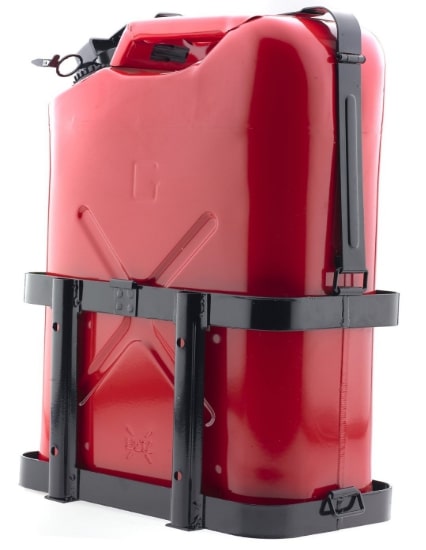
A Complete Guide To The Best Gas Cans To Store Extra Fuel
Because gas cans are the best way to safely and reliably store gasoline.
For example:
In a mass evacuation situation, you’ll want to drive your way to safety – FAST!
That’s why it’s a gamble to rely on gas stations.
Because even if they’re open, the lines will be excruciatingly long.
And they’ll run out FAST.
TOPICS IN THIS GUIDE… ↓(click to jump)
- Best Gas Cans For Everyday Use
- Best Gas Cans For Preparedness
- Why You Should Invest In Them
- Types Of Cans (Pros & Cons)
- Different Sizes Of Gas Cans
- Gas Can Nozzles (Pros & Cons)
- Must Have Gas Can Safety Features
Best Gas Cans For Everyday Use
When the world functions normally, you can get by with a can or two.
Most folks own a standard 5-gallon gas.
Once you fill up regularly when needed.
And a smaller 1 or 2-gallon container fills the lawnmower or chain saw.
Here are a few top picks for these everyday cans:
Garage Boss offers many plastic solutions for DIY lawn and AutoCare.
This is the Garage Boss GB310, and it is a great gas can for around the home.
They have made it easy for every family member to safely dispense gas with their press' n pour system.
Pouring gas shouldn't be hard, and spills are the worst.
With Garage Boss, you simply put the spout into your desired tank and press a button, and the fuel starts flowing.
Then watch the flow through the translucent spout and release the button when you are full. You can also unscrew the extension spout for a faster rate of flow.
It comes in 1 gallon, and 5 gallon gas cans to meet your primary fuel storage and transportation needs.
↓ Harbor Freight’s Garage Boss 5-Gallon Fuel Can
The No-Spill 1450 5-Gallon Poly Gas Can is another excellent buy for everyday use.
It is a wide, stable design to prevent tipping over and has an extra handle on the back for heavy lifting.
No-Spill prides itself on the fastest flow in the industry at 3 gallons a minute. So, your refueling happens quickly and painlessly.
The spout design features a handy push-button control with an auto flow stop. So, you can now say goodbye to smelly messes.
No-Spill Gas Cans come in several sizes, including 1 1/4, 2 1/2, and a 5 gal gas can. They also have yellow and blue fuel cans for your diesel and kerosene.
↓ No-Spill 5 Gallon Review
Surecan's 5 Gallon Self Venting Gasoline Fuel Can Container is what you want for all your yard duties.
This innovative gas can removes all the bending, tipping, and holding of a heavy container as you pour.
It measures out at 13.1x10.24x15.61 gas can 5 gallon capacity, so you can power all your machines.
It also has a 180-degree flexible rotating nozzle. So pouring is made easy, and because it's self-venting, you get a smooth fuel flow.
A thumb trigger puts you in total control of what you are dispensing, making spills a thing of the past.
Surecan even adds a child-proof cap with a tether, so you never misplace it. Well done, Surecan!
↓ What Is SureCan?
Best Gas Cans For Prepping & Storage
Now it’s time to check out your worst-case scenarios.
These are hefty ones designed to give you the fuel resources required when TSHTF.
For your prepping, you need a bigger solution, don't you? We have it here with Scepter.
Their 14 gallon portable gas container is built for mobility and large capacity.
It's made from durable polyethylene and has built-in 6 inch wheels on the high-density structure. That means you are taking 14 gallons of gas with you on wheels!
When needed, there is no lifting and pouring. You just use the siphon hose pump system to refuel all your machinery and other gas cans.
The hand pump also eliminates spillage by stopping and restarting gas flow, and it has a fast 2 gallon flow rate.
↓ Duramax Flo n Go 14 Gallon Gas Tank With Hacks
↓ Justrite Galvanized Steel Review
Wavian makes an excellent option for a bug-out vehicle.
The Wavian 3009 5.3 gallon Jerry Can is made out of 0.9-millimeter cold-rolled steel. This provides ultra durability for the long term.
It has a unique, extra-wide channel breather for a smooth pouring spout.
This metal gas can is lined with a petrol, water, and alcohol coating to prevent rusting.
And its locking security pin won't allow for accidental leaks or spills during transport.
It's one of the best prepper gas cans on the market today.
↓ Wavian NATO Jerry Fuel Can
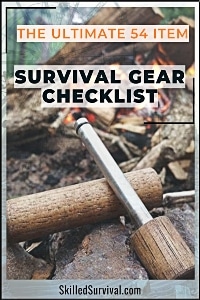
Want a free 54 item survival gear checklist?
Enter your email below to instantly download this Complete Checklist PDF. No purchase necessary. 👇 👇Reasons Why You Should Invest In A Quality One
GAS… that combustible elixir that powers so many things.
But with power comes risk.
You can’t just go to the gas station and get a bucket full.
You need a sealed container, engineered to carry fuel.
In the land of “make-believe,” we’d drive around with friends and never run out of gas.
This world would also be full of candy floss and free beef jerky for all to enjoy, and nobody would ever die!
Sorry folks… this isn’t Barbie’s Dream House Adventures.
Because in real life, catastrophes happen; look to history for proof.
And in a crisis, the first thing that becomes short on supply is fuel.
Here are just a few scenarios where you need extra fuel:
- EMP Blackout
- Nuclear Attacks
- Natural Disasters
- Martial Law
- Civil War
OK, so you need to have available gas on hand.
- Why invest in a quality gas can?
- Why not just buy the cheapest ones you can find?
Durability
You could put gas in milk jugs, but you’re building a crude DIY bomb.
You need a container designed for fuel, which means it’s made of a durable material like hard plastic or metal.
This keeps the gas safe and protects it from accidental ignition.
Stability
Besides the material used, the gas must remain upright during storage and transport.
We’ve all seen liquid containers tip over due to bumps or sharp turns.
Instead, a quality one will have a strong base and won’t easily overturn.
Plus, the best ones have a boxy shape.
That way, you can stack them side-by-side to stabilize the fuel load without gaps.
No Spills
It should make a tight seal, no matter how often you open and close it.
Gas leaking in your vehicle or all over your clothes while refueling machinery is dangerous.
It’s essential to keep the flammable liquid inside, even if it gets knocked over.
↓ Storing Fuel For Preppers
Types (Pros & Cons)
While you could call any container, you put fuel in a “gas can,” their two official gas designations.
These include:
Type 1 Gas Cans
This fuel can type has only a single opening for filling and dispensing fuel.
And they include a funnel for accurate pouring. This type is best for receiving tanks with large openings.
Pros
- More economical
Cons
- More prone to spilling because of the funnel
Type 2 Gas Cans
Type 2 has, you guessed it, two openings. One is for filling, and one is for pouring.
The filling hole also serves as a vent, and this opening usually includes a spout.
Pros
- They cost more than type 1
Cons
- It has a spout that securely attaches
- They are easier to pour
Jerry Cans
In the 1930’s Germany invented the Jerry Can.
A jerry can is a container carrying large amounts of fuel for army vehicles.
They weren’t stackable but included 3 handles, so soldiers could carry two of them using one hand.
The Allied forces had their own stackable design that used a thinner metal.
But they were leaky and needed a wrench to open and a funnel to pour.
Color Codes
Today’s fuel cans come in different colors that designate the type of fuel inside.
These are:
- Red for gas
- Yellow for diesel
- Blue for kerosene
- Green for oils
This color scheme is an excellent way to prevent accidental mix-ups of your fuels.
Pro Tip: Also, never use any gas can to store water. It will make the water unpotable and rust the inside of the container.
They’re typically constructed out of either metal or plastic.
Metal Gas Can
Metal cans are great for long-term fuel storage, but they do have the potential to rust.
Also, they could explode if they are inside a building during a fire.
So make sure you should keep all fuel storage spaces well-ventilated for safety.
Plastic Gas Cans
Hard plastic is a versatile material used and can be puncture resistant.
When in a fire, they will melt, and plastic can expand and contract as the temperature changes.
But if you store gas for several months, fuel can leach into the plastic.
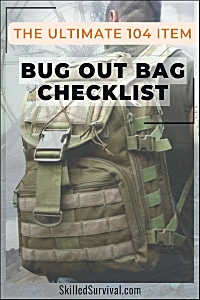
Want a free 104 item bug out bag checklist?
Enter your email below to instantly download this Complete Checklist PDF. No purchase necessary. 👇 👇Different Sizes
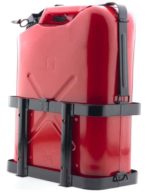
So, the BEST Gas Can for YOU depends on your equipment needs and lifestyle choices.
And one of the first things you should get right is the appropriate size and number of containers.
There are many sizes, but the standard sizes are 1g, 1.5g, 2.5g, 5g, and beyond.
A 5-gallon can is your primary size for a survivalist.
Why? Because they’re easy to carry and have an adequate amount for an emergency.
Consider buying several 5-gal gas cans to fill ahead of time.
And then haul them with you when bugging out or setting off to an undisclosed off-grid location.
A 10-gallon gas can is helpful for static storage and is perfect for prepping extra fuel.
But it’s heavy to haul around by hand.
So, 5 gallons is better unless you have a permanent mounting location.
If you have a chainsaw and are hiking into the bush to do some clearing, a 1-gallon gas can is ideal.
These smaller ones are easy to carry in one hand while keeping your chainsaw in the other.
When storing fuel, ensure it is safely stowed in a well-ventilated storage shed.
A shed far away from any potential ignition sources.
It’s always a good idea to have an extra spout around, too, in case you lose one.
Pro Tip: 5-gallon gas cans are your ideal fuel storage size. You can easily fill and transport these up to your survival cabin. And fill up larger metal fuel storage tanks every time you go.
Make sure to use up gas within 3-6 months (a year max). Unless you regularly treat your gasoline with a stabilizer.
- Keeps fuel fresh for up to 24 months during storage
- Eliminates the need to drain fuel prior to storage
- Ensures quick, easy starts after storage
- Prevents gum and varnish build-up
Types Of Gas Can Nozzles (Pros & Cons Of Each)
When it comes to nozzles, there are two basic types: flexible nozzles and rigid nozzles.
Flexible
This is the most common type you’ve probably used many times.
It has a flexible shaft that allows for a variety of pouring positions.
And it can come in a wide or narrow nozzle to regulate the flow rate.
You are also able to reach pouring openings on your machinery better.
The density of the nozzle material and its thickness determines its flexibility.
Pros
- These are the most common, so replacement is easy.
- Allows you to direct the flow in hard-to-reach openings
- Some are telescopic
Cons
- It is often under tension while pouring, and as you pull the nozzle out, it can flick gas around.
- They can crack because they are thin and always being bent and manipulated
Rigid
Rigid is the opposite: it has a firm nozzle with no give.
The big plus is your fast fuel flow, as polymer plastic can be more expensive.
The length of the shaft comes in different sizes.
Some have a bend on them to allow a better angle without spillage.
Pros
- It gives you a fast flow, so filling up happens quicker
- No handling a flexible nozzle
Cons
- More prone to spilling if you can’t get at the machine’s gas tank opening
- Harder to get the nozzle in when lifting a heavy one
Some nozzles are interchangeable with a standard-sized, threaded hole.
Use both and see what works best for your various uses.
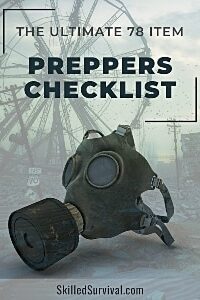
Want a free 78 item preppers checklist?
Enter your email below to instantly download this Complete Checklist PDF. No purchase necessary. 👇 👇Gas Can Safety Features
Fuel is a powerful substance we need to have on hand as survivalists, so it is vital to use good-quality fuel.
Here are key features to look for:
Pressure Relief
This is how you prevent one from exploding.
The container will vent automatically when the pressure increases to 3-5 pounds.
And then it will reseal itself.
Spring Loaded
Unsecured lids can easily spill from accidents like getting knocked over or sloshing.
These self-closing lids make sure you are spill-free.
Flame Arrestor
Gas vapors are highly flammable and can ignite outside of the can.
A flame arrestor screen prevents a fire from igniting the gas fumes within.
Want a free 54 item survival gear checklist?
Enter your email below to instantly download this Complete Checklist PDF. No purchase necessary. 👇 👇Final Thoughts
That is today’s upgraded knowledge on the survivalist’s best gas can.
Before you buy, remember…you often get what you pay for…
Want proof? Spend a few minutes watching the following video.
↓ Testing Cheap Vs. Expensive Cans On Amazon

Prepare, Adapt & Overcome,
P.s. - I just found out 2 out of 3 Americans don’t feel prepared for a 3 day disaster!!!
I guess this goes to show how modern society continues to embrace ‘living a fragile life.’ What’s crazy is… it’s so easy to fix.
To make sure YOU have the basics, watch our FREE training on “10 Simple Steps To Basic Preparedness” that shows you HOW.
Nothing crazy here… this isn’t doomsday prepping... just the basics every responsible adult should have before a disaster strikes.Why You Can Trust Skilled Survival...
Go here now to review a full breakdown of:
- Who We Are
- Our Credentials
- Our Mission
- & Product Recommendations...
Here are a few highlights of our teams credentials & certifications:
- Certified Member of a Mountain Search & Rescue Organization
- Plant Emergency & Safety Leader for a Major Food Manufacturer
- Member of the 10TH Mountain Division Hut Association
- Certifications: Avalanche 1, WFR, CPR
- Official Gear Tester for Numerous Outdoor Gear Companies
- Countless Multiday Backpacking trips into Remote Wilderness
- Bachelor's Degree In Mechanical Engineering
- Bachelor's Degree In Civil Engineering
- Bachelor's Degree In Biomedical Engineering
"It takes 20 years to build a reputation and five minutes to ruin it." - Warren Buffett
We're fully aware that trust is NOT something you GET but is EARNED.
And we'll continue to earn YOUR trust through our forthright and honest approach with each new Blog Post, Guide & Product we create...
P.s - I just took this FREE 60-second 'Readiness Score Quiz'👇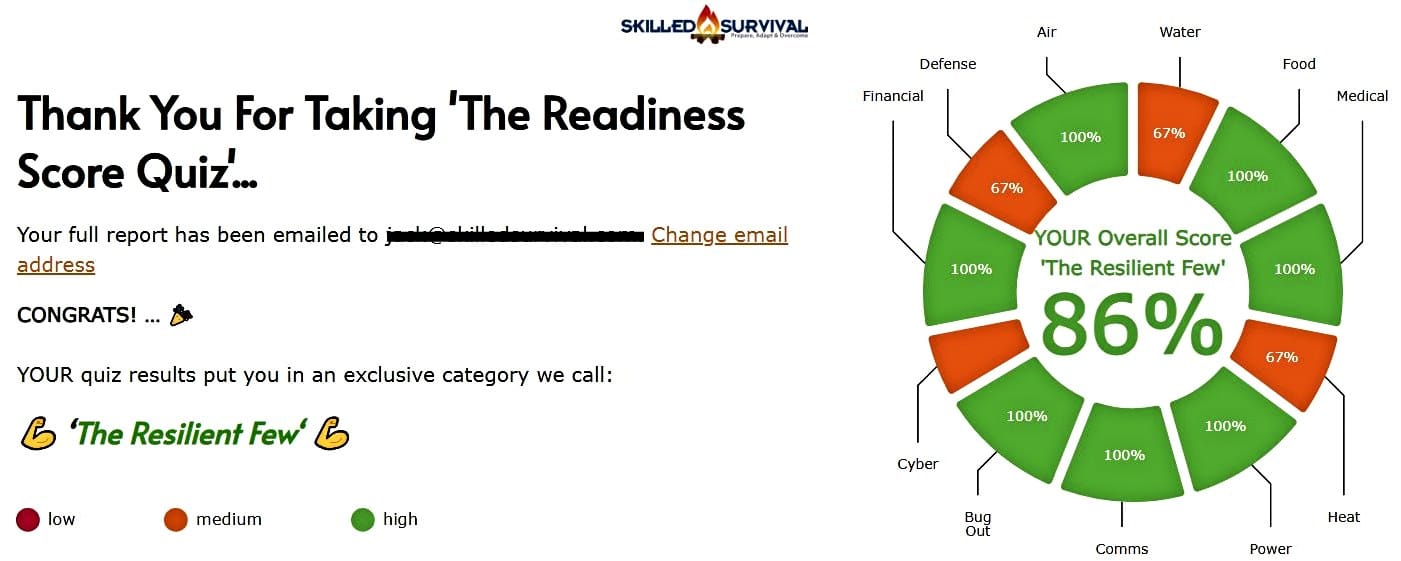
AND... I've still got a few gaps in my preps...🤔 But at least, I'm not part of 'The Fragile Masses'. 👍 Find out where YOU stand by answering a few questions...
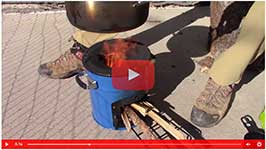
Recommended Reading
5 Best Vacuum Sealers Hand-Picked By A Survival Expert
Vacuum sealer are an essential kitchen appliance to keep food fresh and avoid unnecessary waste. We review the top 5 on the market today.
Camping Generator: The Best Setup For Whisper Quiet Power
You need quiet power for both camping and survival. In this article, I share the best camping generator and how to modify it for silence.
Hand Crank Generator: Best Ones For DIY Emergency Power
A hand crank generator is a wise black-out backup tool. We show you the best ones to keep your family safe in a long term power outage.
9 Best Solar Radios Hand-Picked By A Survival Expert
Everyone needs a solar radio for life-saving weather alerts and emergency information. We share the best solar radios on the market today.
Survival Bag: Best Ones Hand-Picked By Our Gear Expert
Settling on the RIGHT survival bag can be an overwhelming task. But we make it easy by focusing on only the best ones available today.
Portable Power Station: Best Ones For Power Outages
We review the best portable power station on the market. And break down the features you'll want for camping, traveling, and emergencies.











